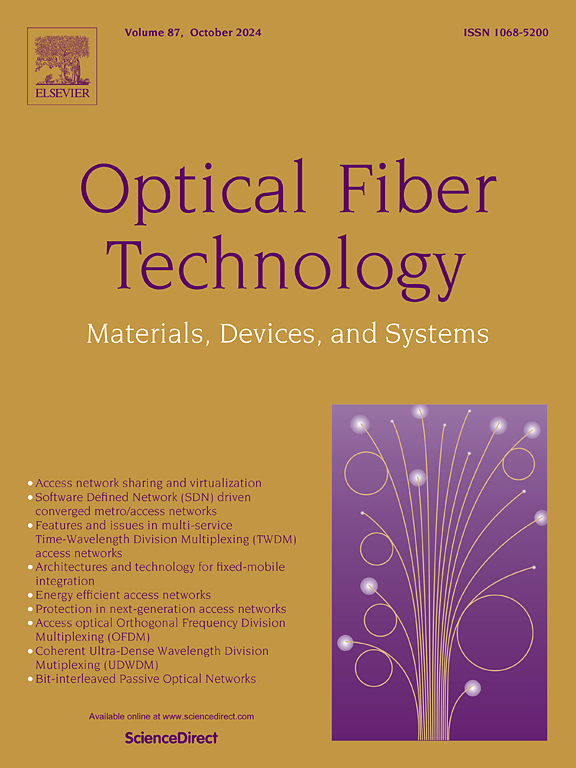Temperature-insensitive and cost-effective distributed NP-Doped optical fiber sensors
IF 2.6
3区 计算机科学
Q2 ENGINEERING, ELECTRICAL & ELECTRONIC
引用次数: 0
Abstract
This paper presents the development of a cost-effective distributed optical fiber sensor for temperature-insensitive assessment of mechanical disturbances along an optical fiber cable. The proposed sensor system uses a nanoparticle (NP)-doped optical fiber with enhanced Rayleigh backscattering to provide higher sensitivity and spatial resolution using the transmission and reflection analysis (TRA) approach, where the transmitted and backscattered optical powers are analyzed as a function of the mechanical disturbance. In addition, Fiber Bragg Gratings (FBGs) are used as wavelength filters to provide the wavelength division multiplexing of the proposed device, which enable the use of 3 different NP-doped optical fiber sections for simultaneous detection of multiple curvature conditions in a cost-effective distributed sensing approach. The sensor characterization tests are performed by means of applying curvature angles from 360° to 1080° at different positions along NP-doped fibers (namely 25 mm, 100 mm and 175 mm) at 4 different temperatures of 25 °C, 30 °C, 40 °C and 50 °C. The results indicate the feasibility of the proposed approach, where the temperature variations lead only to a wavelength shift of the Bragg wavelength, whereas the mechanical disturbances (the curvatures) lead only to variations in the transmitted and reflected optical powers. Thus, by analyzing the transmitted and reflected optical powers in conjunction with the Bragg wavelength shift, it is possible to estimate both the mechanical disturbance amplitude (i.e., curvature angle) and the position along each NP-doped optical fiber section. Results indicate a relative error of around 3 % and 4 % for the mechanical disturbance location and absolute value, respectively. Moreover, the temperature cross-sensitivity in this case is below 2 % considering both amplitude and location of the mechanical disturbance. The proposed approach can be applied in structural health monitoring of different types of structures by integrating the fibers in the structures themselves with the possibility of measuring the strain distribution along the fibers (instead of in different points along the fiber) using a lower cost hardware when compared with similar distributed optical fiber sensing approaches.
对温度不敏感且经济高效的分布式掺氮光纤传感器
本文介绍了一种经济高效的分布式光纤传感器的开发情况,该传感器用于对光缆沿线的机械干扰进行温度敏感性评估。所提出的传感器系统采用了掺有纳米粒子(NP)的光纤,具有增强的瑞利后向散射,利用传输和反射分析(TRA)方法提供更高的灵敏度和空间分辨率,其中传输和后向散射光功率作为机械干扰的函数进行分析。此外,光纤布拉格光栅(FBG)被用作波长滤波器,为拟议设备提供波分复用功能,从而能够使用 3 个不同的掺 NP 光纤段,以经济高效的分布式传感方法同时检测多种曲率条件。在 25 ℃、30 ℃、40 ℃ 和 50 ℃ 四种不同温度下,在掺 NP 光纤的不同位置(即 25 毫米、100 毫米和 175 毫米)施加 360 ° 至 1080 ° 的曲率角,进行传感器特性测试。结果表明了所提方法的可行性,温度变化仅导致布拉格波长的移动,而机械干扰(曲率)仅导致透射和反射光功率的变化。因此,通过分析透射和反射光功率以及布拉格波长偏移,就可以估算出机械干扰的振幅(即曲率角)和每个 NP 掺杂光纤段的位置。结果表明,机械扰动位置和绝对值的相对误差分别约为 3% 和 4%。此外,考虑到机械干扰的振幅和位置,这种情况下的温度交叉敏感性低于 2%。与类似的分布式光纤传感方法相比,所提出的方法可用于不同类型结构的结构健康监测,通过将光纤集成到结构本身,使用较低成本的硬件测量沿光纤(而不是沿光纤的不同点)的应变分布。
本文章由计算机程序翻译,如有差异,请以英文原文为准。
求助全文
约1分钟内获得全文
求助全文
来源期刊

Optical Fiber Technology
工程技术-电信学
CiteScore
4.80
自引率
11.10%
发文量
327
审稿时长
63 days
期刊介绍:
Innovations in optical fiber technology are revolutionizing world communications. Newly developed fiber amplifiers allow for direct transmission of high-speed signals over transcontinental distances without the need for electronic regeneration. Optical fibers find new applications in data processing. The impact of fiber materials, devices, and systems on communications in the coming decades will create an abundance of primary literature and the need for up-to-date reviews.
Optical Fiber Technology: Materials, Devices, and Systems is a new cutting-edge journal designed to fill a need in this rapidly evolving field for speedy publication of regular length papers. Both theoretical and experimental papers on fiber materials, devices, and system performance evaluation and measurements are eligible, with emphasis on practical applications.
 求助内容:
求助内容: 应助结果提醒方式:
应助结果提醒方式:


